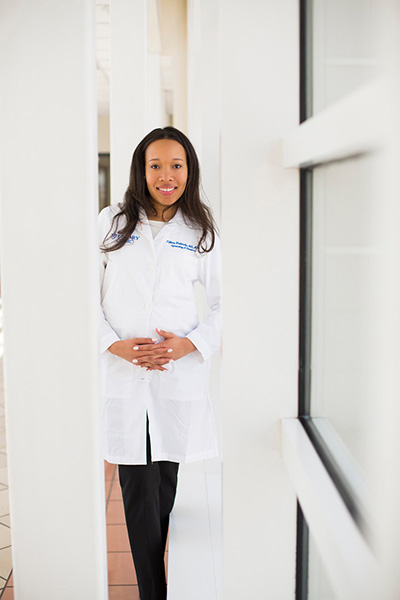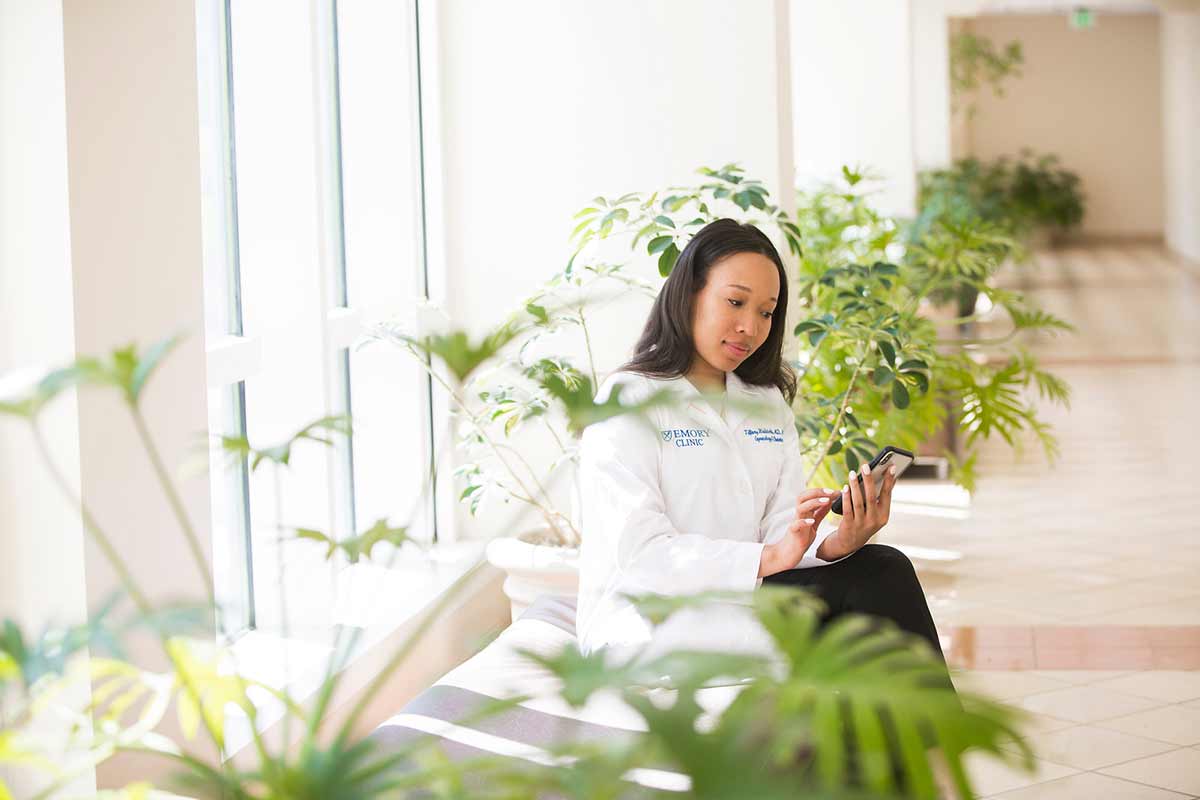Empowering Teens with Open Doors, Honest Conversations
Tiffany Hailstorks, MD, MPH with Emory Department of Gynecology and Obstetrics Family Planning Division offers patients empathy, education, and support.

A simple, unassuming poster hangs on the wall of Tiffany Hailstorks', MD exam rooms.
It outlines 21 reasons for women to see the gynecologist before they turn 21 years old, and covers overall health, periods, pregnancy, sexual health, sexuality and sexually transmitted infections.
“That poster is one of my favorite resources to help educate my patients,” says Dr. Hailstorks. “Women see it and remark, ‘I didn’t know you could help with that’ or ‘I wouldn’t have thought to ask you about this.’ It is a great conversation starter for important reproductive health topics.”
Conversation and education play key roles in Dr. Hailstorks’ approach to reproductive health. As a member of the Family Planning Division within the Department of Gynecology and Obstetrics at Emory Healthcare, she works with teens and young adults across Atlanta, educating them about their reproductive health and empowering them to make healthy and safe choices that last a lifetime.
“It can be hard for teens to see how a decision when they’re 15 can affect their future,” she says. “Teaching them about their reproductive health - and that’s everything from understanding their periods and reproductive cycles to learning about contraception or how to maintain healthy relationships - can help teens make more informed decisions about their bodies.”
A Personal Approach to Care
Dr. Hailstorks has long understood the value of advocating for and supporting her patients. In fact, it was the opportunity to help and connect with others that drew her to medicine. As a young girl, she would often run clinics for her dolls, taking care of their ailments and even pretending to perform surgery on “serious” cases. Her neighbor, a primary care physician, noticed her interest and agreed to sit down for an informational interview.
It was that conversation, and her experience as a volunteer at a local children’s hospital, that showed her the power of the patient-provider relationship. In medical school, she discovered the perfect specialty that allowed her to combine her passion for patients along with her interest in surgery - obstetrics and gynecology.
She later had a mentor during medical school who introduced her to family planning.
“I would just pick my mentor’s brain - asking her about family planning and her background and training,” Dr. Hailstorks says. “I quickly realized that family planning incorporated everything I was interested in - from adolescent health to teen pregnancy prevention and contraceptive health, along with the ability to build lasting relationships with my patients.”

"Our bodies are nothing to be ashamed of, and I encourage my patients to ask whatever questions they may have - without worrying that I will judge them for whatever it is they want or need."
Tiffany Hailstorks, MD
Dr. Hailstorks was accepted into the family planning fellowship at Emory University School of Medicine. In the program, she received specialized training on reproductive health and contraceptive care. Now, she works closely with her patients, educating and involving them in their reproductive health.
“I treat patients how I would want someone to treat my family,” she says. “That mindset helps you always put your best foot forward and think first about your patients. Some days it may be hard, but it always makes a difference. You’re really helping the lives of the women who need that support and empowerment.”
Even though she recently finished her fellowship and completed a Masters in Public Health at Emory Rollins School of Public Health, Dr. Hailstorks has no plans for slowing down her personal learning and growth.
“Fellows in reproductive health often pursue a master’s degree in public health,” she shares. “My ultimate goal would be to influence what the school system is teaching when it comes to reproductive health or to work with the health department. Reproductive health education should go far beyond contraception to share accurate and relatable information.
“I love being able to tell people about all their options,” Dr. Hailstorks continues. “But sometimes, my patients just don’t know or aren’t aware of what’s available to them, or what may be best for them given their health or personal situation and goals. Education can help change that.”
Removing the Stigma
Dr. Hailstorks acknowledges that a woman’s reproductive health can be a difficult subject for many women to broach with their doctor. That embarrassment and uncertainty can be especially acute for teens and young adults who are just beginning to learn about their bodies. “The gynecologist is a safe, neutral space,” she says. “Our bodies are nothing to be ashamed of, and I encourage my patients to ask whatever questions they may have - without worrying that I will judge them for whatever it is they want or need.”
Dr. Hailstorks firmly believes that the key to bridging that gap is, once again, education: When women understand their bodies, they are confident to ask questions, bring up issues and seek medical care.
“Here, it doesn’t matter where you come from or what you need,” Dr. Hailstorks says. “I want to work with each of my patients and understand their unique needs. I want to advocate for them and help them advocate for themselves. When you educate and involve patients in their reproductive health, everyone wins.”
This comprehensive, empowering approach to reproductive health is a hallmark of family planning. Services include educational, medical or social services that help patients decide if, when and how they want to become pregnant.
Building Trust
The Emory Healthcare family planning team is dedicated to offering high-quality care - including routine gynecological and reproductive health care, contraceptive care, education and support - in a safe and non-judgmental environment.
When teens and young adults are ready to talk about sex and contraception, Dr. Hailstorks and her colleagues are here to have open and honest conversations.
“We’re going to talk about all the options, and it’s okay to talk about those options,” Dr. Hailstorks says. “It’s comforting for patients to hear that.”
Patients are also often relieved to find that Dr. Hailstorks’ office is a confidential space.
“The only way I can work with my patients to find a solution that will work for them, and keep them safe and healthy, is to build trust and confidence,” she says. “That’s important for all my patients, and particularly teens and young adults.”
Dr. Hailstorks is dedicated to walking through each of the contraceptive care options available and finding the one that will work best for the patients.
“Sometimes there are medical reasons a patient should try a specific type of contraception,” she says. “Other times, it’s a personal preference or what works with their lifestyle. I’m not going to ask a patient to come see me every month to get a pack of pills if they have school or need to take three buses to get to the office. We’ll work together to find the right solution for her.”
Meeting Patients Where They Are
According to the Guttmacher Institute, more than 19 million women in the U.S. do not have reasonable access to contraceptive care in their counties. The Family Planning team at Emory is working to deliver better access to care by partnering with organizations across the area and offering services at multiple locations.
Currently, the team rotates across four locations, including Grady Memorial Hospital, Emory University Hospital Midtown, Feminist Women’s Health Center, Atlanta Women’s Center and Planned Parenthood of Atlanta. There are teen clinics at Grady Memorial Hospital, Emory University Clifton Campus, carafem Health Center, and most recently, at Emory Saint Joseph’s Hospital.
“One of the biggest barriers for teens to overcome is getting to appointments between 8 and 4 during the school day,” Dr. Hailstorks says. “The Teen Clinic at Grady helps knock down some of those obstacles with hours after school and on the weekend. That makes it easier for teens to get birth control, take a pregnancy test, have their annual exam or address any other gynecologic issue they’re experiencing.”
It’s not just teens that are benefitting from reproductive health outreach. Partnering with organizations like Planned Parenthood, Atlanta Women’s Center and The Feminist Women’s Center ensures high-quality care is available to women of all ages.

We meet patients wherever they are,” says Dr. Hailstorks. “We rotate through a lot of different clinics, but we’re still offering the same level of care as we do to patients at Emory. That offers a layer of comfort and confidence to the women we see. They can trust that we are here to help them think through all their options, and help them find what is best for them.”
Schedule an Appointment
Learn more about the Family Planning team at Emory Healthcare by calling 404-778-3401 or by visiting our Website.




